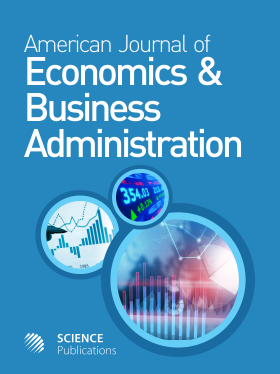A Theory of the Risks of Venture Capital Financing
- 1 Pace University, United States
Abstract
Problem statement: There is no general theory analyzing how the time-varying cash flows of venture capitalist financing affect the likelihood of success of a new venture. This research addressed that lacuna in the literature. Approach: Research in the area of venture capital financing was needed because of the importance of new ventures as germinators of technological innovation. The research in this study developed a general economic theory quantifying the risk of venture failure associated with time-varying cash flows of financing. Each occasion when an entrepreneur made an overture to a venture capitalist to elicit a financing commitment was defined to be a distinct "solicitation event". The series of financial commitments elicited from venture capitalists were assumed to have the characteristics of independently distributed random variables. It was assumed that the entrepreneur must secure a minimal aggregate commitment in order to ensure development of the project; failure to secure that amount caused the venture to be aborted. The theory of stochastic processes was applied to derive the practical implications as regards the risk of abortion. Results: It was shown that the aggregate financing commitment secured by an entrepreneur in a finite time had stochastic properties corresponding to those of a statistical renewal process. The research derived limiting conditions on the probability that entrepreneur’s venture will be aborted because of his failure to secure the minimal aggregate commitment. The main result was that if the number of solicitations by the entrepreneur is large and the financial commitments were independently distributed random variables with finite means and variances, the probability distribution governing venture survival is the Normal distribution. Conclusion: The study derived four analytical propositions quantifying the trade-offs between the risk and the expected return associated with venture capital financing. The policy implications of the results imply the benefits of mitigating information asymmetry. Some of the risk faced by the entrepreneurs could be attenuated if information about the risk/return preferences of venture capitalists were known to the entrepreneurs prior to solicitation. Some of the risks faced by the venture capitalists could be attenuated if information about the risk/return characteristics of the proposed investment project could be accurately and transparently communicated to the venture capitalist during the solicitation event. If either or both of these information deficits were palliated, the market for venture capital would operate more efficiently.
DOI: https://doi.org/10.3844/ajebasp.2009.194.205

- 6,270 Views
- 5,584 Downloads
- 1 Citations
Download
Keywords
- Entrepreneurial solicitations
- venture capital financing
- stochastic processes
- probability of entrepreneurial insolvency
- renewal process
